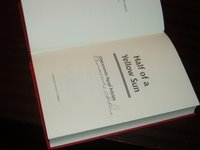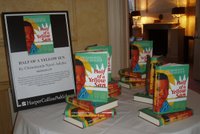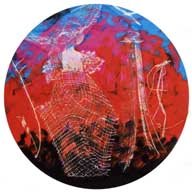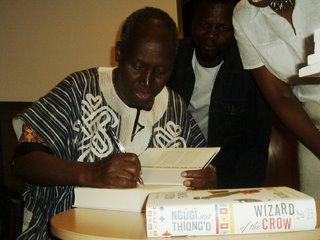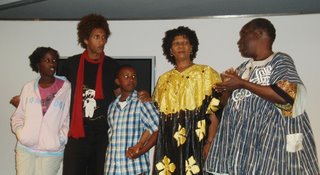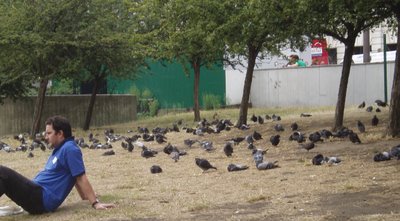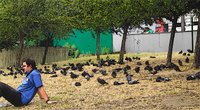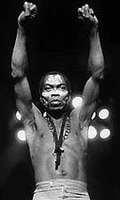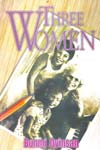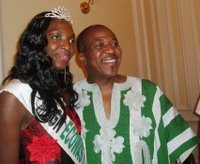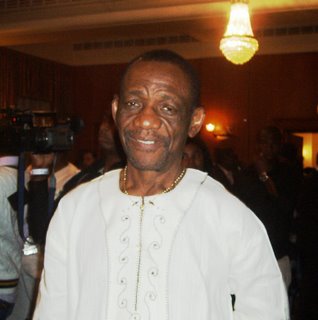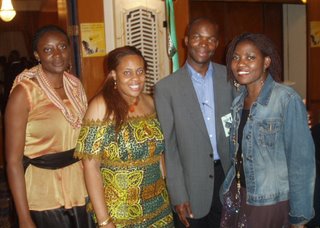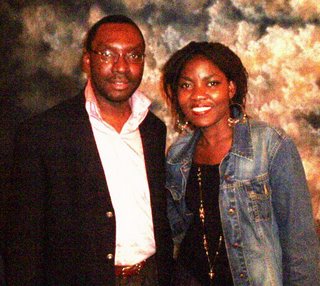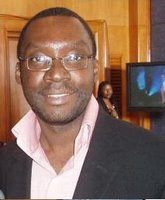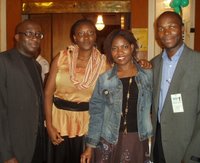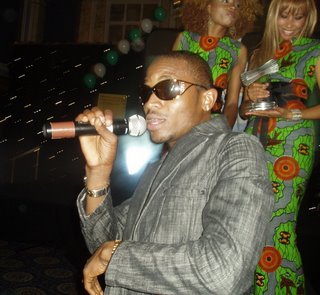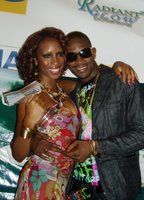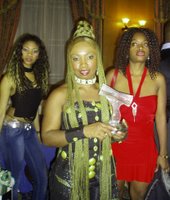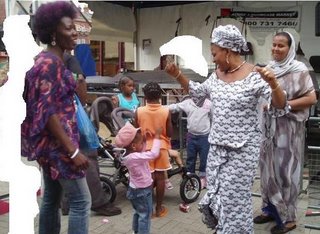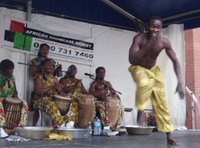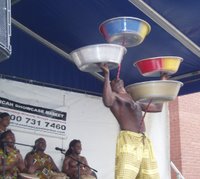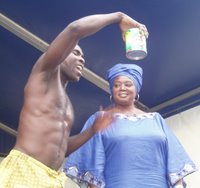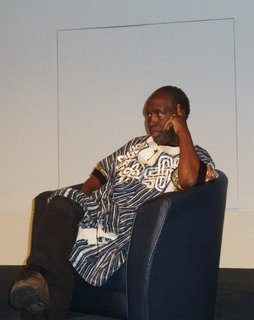 On Thursday 10th August, Ngugi wa Thiong'o kept a date with lovers of African literature, at a reading and discussion of his new novel, Wizard of the Crow. Here he is at Congress Centre, London.
On Thursday 10th August, Ngugi wa Thiong'o kept a date with lovers of African literature, at a reading and discussion of his new novel, Wizard of the Crow. Here he is at Congress Centre, London.
- My account of the evening is published today...
Wizard of the Crow: Ngugi Reads in London
By Molara Wood
On August 11 2004, Kenyan writer Ngugi wa Thiong’o, who had made a triumphant return to his country after 22 years in exile, was attacked by four men. One of Africa’s greatest writers, he was beaten and burned with cigarettes on his face; his wife Njeeri - was raped.
Ngugi (as he is popularly known) had told an interviewer beforehand: "In a spiritual sense, I have never left Kenya. Kenya and Africa are always in my mind. But I look forward to a physical reunion with… my beloved country." The novelist hoped to get in touch with the ‘everyday’; instead, he found what he later described as "a nightmare".
Almost two years to the day, 68-year-old Ngugi has made another return, this time to London - to read his new novel, Wizard of the Crow. He calls England his "second home"; he was very visible there in the 80’s, having left Kenya on exile in 1982. He co-directed his play, The Trial of Dedan Kimathi at the Africa Centre, London, later leaving for the United States in 1989. Fittingly for a writer of Marxist leaning, the appearance was at Congress Centre - the UK home of the Trade Union Congress.
Many had bought copies of Wizard of the Crow at the door, and were already leafing through the work as they waited for Ngugi. In the audience was Sarah White who (along with the late John La Rose) is acknowledged in the 766-page book for an active role in the Kenyan struggle; Ngugi also thanked them on the night for campaigning for his release from prison during the late 70’s. Also in the audience were: Professor Biodun Jeyifo; and Caine winners Brian Chikwava (2004) and Segun Afolabi (2005).
Anchoring the event was a long-term friend of Ngugi’s. He spoke briefly about the author’s life and times, his books, awards and stellar academic positions (Ngugi is currently the Distinguished Professor of English and Comparative Literature; and directs the International Center for Writing and Translation at the University of California), describing him as "one of the major essayists of our time". However, the essays are largely unpublished, and "it is as a writer that we know him."
Wizard of the Crow, though voluminous, was described as "extraordinarily readable", competing in size and scope with Dickens’ Nicholas Nickleby.
Ngugi read two passages. The first, features a black character suffering from white-ache. "Let me explain," Ngugi offered. "Some have headache, some have stomach ache, but this individual has white-ache." The second passage, about love, was timely, "especially as my wife has come." The audience turned to catch a glimpse and applaud as Njeeri wa Ngugi walked to her seat. Following were the couple’s three children. Things went quiet for the second passage, read by Ngugi in limpid and mesmerising tones.
"Art is for me a very important calling - not a means to politics, but politics is part of art," he declared in the discussion that followed, adding that, to him, art encompasses everything about being human. The politicians in Wizard of the Crow however, are all about power and have no appreciation for art.
The title derives from a standard reference in Kikuyu storytelling. "When I was young, we used to hear stories of sorcerers so powerful that a glance from them could make a bird drop from the sky." Ngugi’s earlier novels were moulded after the realism of the 19th century English novel, having been educated reading the likes of Jane Austen. Later novels are a departure. "Realism is good in giving a portrait of society, but it is also limiting. When I started writing in Gikuyu, I realised that the orature of African tradition is not limited in space or time."
Ngugi bade his farewell to the English language with the theoretical work, Decolonizing the Mind. His novels in Gikuyu include Devil on the Cross (translated into English by Ngugi himself) and Matigari (translated by Wangui wa Goro). The author self-translated Wizard of the Crow,
partly because "it is very long." He is also committed to the process "because I believe in translation. When I abandoned writing in English, I received a lot of criticism." However, "I wanted to show that to write in an African language does not mean the work is excluded from readers in other languages."
Translation allows him to have a dialogue with culture, as he negotiates between the mischievousness and tonality present in Gikuyu, but non-existent in English. In Gikuyu, "If two women meet and one is dressed well, they don’t compliment each other, instead they mock. ‘Ah, why are you dressed like that… are you going to a wedding… where do you think you are going?’ What they are really saying is: you look nice."
In Wizard of the Crow, Ngugi focuses more centrally on women than in his earlier work, with a female character through whom he addresses "the question of women’s power." Looking over to Njeeri in the audience, he encouraged her to take a bow, musing: "And I must say, having been married to a very strong woman…" it was imperative to take this approach in novel.
Ngugi reflected on the now infamous attack. "We got real power from what you call ‘divine intervention’ because we were able to resist them and that is why we are here today." Asked later about where he stands now spiritually, he replied: "I believe in the spirituality of human assistance." Wizard of the Crow is also a conversation between religions, touching on systems of belief including: African traditional religions, Eastern mysticism and Islam.
There was an "overwhelming reception" from ordinary Kenyans on the author’s return in 2004. "Even more overwhelming, was the reception after the attack… my wife, when she walks on the streets, people cross the road and tell her: ‘thank you for returning.’" When Njeeri went shopping with security men in tow after their ordeal, market women stopped the guards at the entrance, saying: "We will protect her here." According to Ngugi, his wife had "this wall of women, guiding her through the market." He concluded that: "Such overwhelming support outweighs the appalling attack on us by people opposed to what we stand for."
Wizard of the Crow is set in the fictional Republic of Aburiria. Ngugi avoided choosing a specific African country in order "to connect with the post-colonial dictator." The author suggested that despots like Pinochet, Aquino, Mobutu and Amin are "a creation of Western democracies", moulded as such - and "function as a part of the Cold War." The post-colonial dictator "embodies what Nkrumah called, ‘power without accountability.’"
The realism of Ngugi’s earlier novels would not suffice for such a dictator, who is often seen (thanks to propaganda) as "having born before the beginning of the world!" Wizard of the Crow is published in four volumes in Kenya. And in "a privileging of the oral", the book receives ‘oral reviews’ before any comment in print, so that "sales owe much to the oral reviewer."
The author wrote Weep Not Child, The River Between and The Black Hermit, while still an undergraduate at Makerere University. He also wrote a column (As I See It; as James Ngugi) for a newspaper, edited a journal, "and I still wrote my essays on time!" Ngugi likened this to similar achievements by Achebe and Soyinka during the same period. "This phenomenon is placed in the culture of the sixties," he believes.
Reminding that the end of the 50’s into the 60’s occasioned "the high noon of the anti-colonial movement, the independence of Ghana and Nigeria; labour movement in the Caribbean; civil rights in America… we were responding to that energy." Rather than any notions of genius, he credits the "youth and passion" of the 60’s for the literature that emerged from Africa at the time.
According to Ngugi’s discussant, that ‘youth and passion’ is still evident "in the mature writer of Wizard of the Crow."
- Ngugi wa Thiong’o was at Congress Centre, London, on Thursday 10th August. Wizard of the Crow is published by Harvill Secker, UK.





